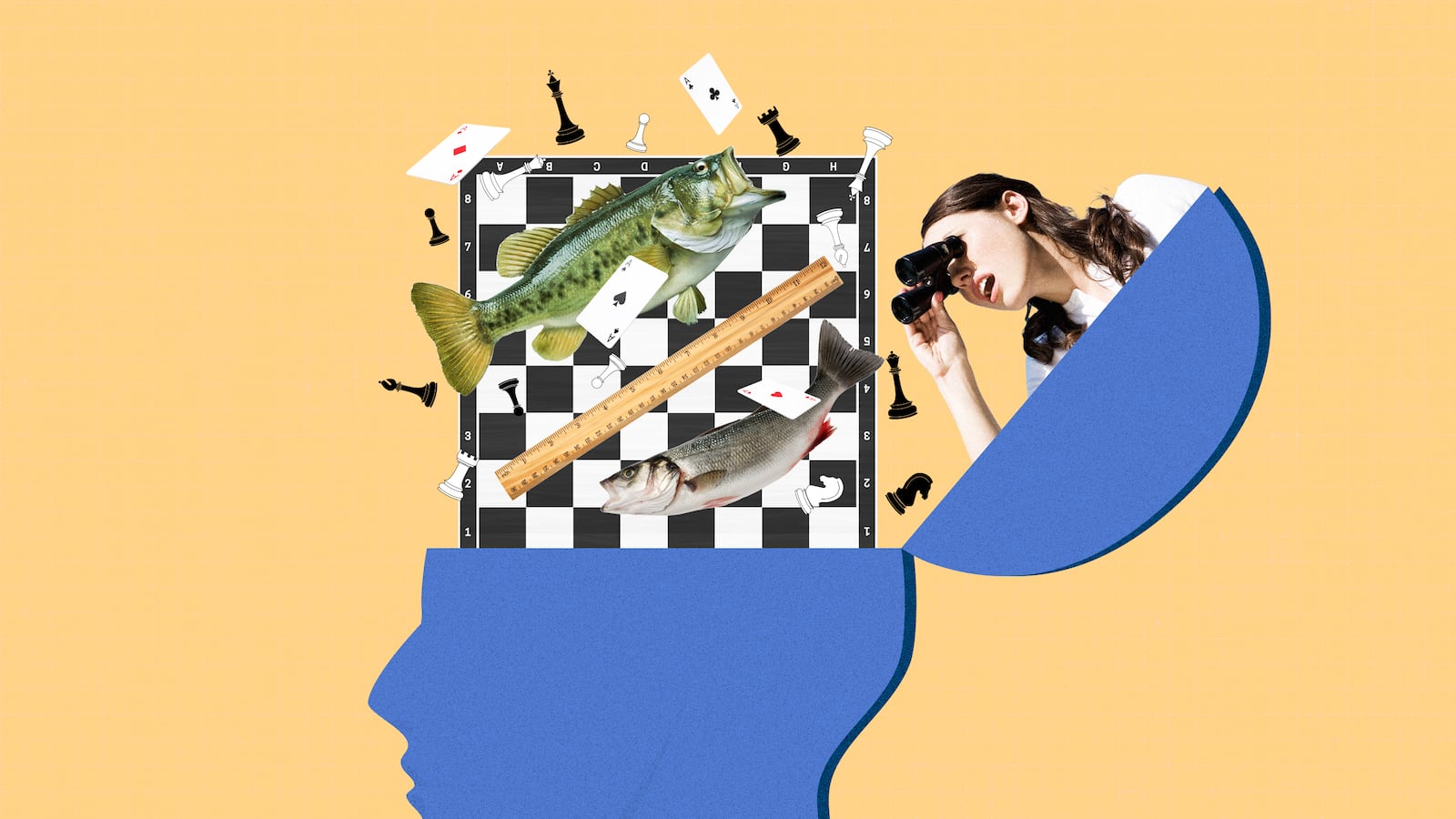The tournament that caused Andrew Cameron to quit competitive fishing was one that he directed. Cameron and his buddies put together a national fishing trail called the Kayak Bass Series, a string of eight or so annual events that each drew several dozen tournament anglers to face off for thousands of dollars in prize money. Cameron and the other organizers had opted to use an app called iAngler for the tournament, which allows participants to catch a fish, take a photo of it on a bump board (the fishing equivalent of a metal shoe sizer), and release it back into the water.
The series had been going swimmingly until a scandal all but ruined the sport for Cameron.
“The one thing that killed it for me was the simple fact that we caught a cheater, and it ended up being a pretty big deal,” he told The Daily Beast. Andrew Shepherd, an angler on an unbelievable winning streak, had tampered with his bump board by cutting out a portion near the base and gluing it back together. The doctored board fooled the app into inflating the length of his catches and made it so he could double count fish by subsequently photographing them on a normal board. After his ruse was detected, he returned $3,000 to the Kayak Bass Series.
The scandal rocked the fishing community and led tournament organizers to institute boat checks and voice stress analysis programs to identify foul play, but Cameron still wasn’t shocked when, this month, the would-be winners of a pro fishing tournament were caught stuffing fish with lead weights and fish filets.
“The unfortunate truth is there’s always going to be people that want to cheat in some way,” he said. “When money’s on the line, people do stupid things, and I’m not sure how any new technology could be developed to stop it.”
It’s not just fishing, either. Cheating scandals seem to be roiling niche communities everywhere, all at once. The chess world has been rocked in recent weeks by explosive cheating allegations that may or may not involve vibrating butt toys; the worlds of poker, Irish dancing, and even beloved Fat Bear Week have faced distinct controversies of their own that raise existential questions about the future of competitions. Could pervasive cheating spell doom for fair play? And do technological innovations offer us a lifeline, or accelerate the demise of our favorite pastimes by encouraging even more adept trickery?
Dictyostelium discoideum is an unassuming (though photogenic) amoeba that lives in the soil and feasts on bacteria. That is, until it runs out of food and begins to starve. Groups of amoebae then enter a stage of their lives where they bond together to ensure their descendants’ survival. Tens to thousands of amoebae aggregate to form a slug that the naked eye can see, and the multicellular body moves up through the soil, toward the light.
What Dictyostelium does next can tell us a lot about how individuals within a single species can develop cheating behaviors over time, said Joan Strassmann, who researches the microbes at Washington University in St. Louis.
According to Strassmann, the slug forms a fruiting body to spread its spores widely. “In this fruiting body, about 20 percent of the cells die to make a hard stalk that the others flow up and turn into spores that can then get dispersed,” she told The Daily Beast. “We think of this as a model system for social behavior and evolution, because some formerly independent, fully functional individuals give up their lives for others.”
When the amoebae making up the slug are clones of one another, this process goes off without a hitch. But when two genetically distinct Dictyostelium amoebae aggregate into a single slug, one of the clones can cheat by producing more spores and less stalk, and relying on the other clone to make a larger sacrifice.
Examples of this kind of foul play exist throughout the microbial, plant, and animal worlds, which suggests that cheating is beyond pervasive—it’s hardwired into all living organisms. Another way to think of this dynamic and the precarious balance it can cause is through the free-rider problem in economics. Within the field, it refers to the issues that occur when people don’t pitch in to support a public good equally, like commuters that hop on a bus without paying. At first, there’s no reason not to cheat: It saves money, and cheaters still get to benefit from the public good.

Joan Strassmann.
Courtesy Washington University in St. LouisWhat evolutionary and economic theories have to do with stuffing fish filets into fish and sneaking an (alleged) vibrating butt plug into a chess match may not be immediately apparent. But behavioral scientists like University of Arizona associate professor Mary Rigdon think about sporting competitions in much the same way that biologists like Strassmann study evolution.
“We have this idea that competition should naturally lead to better athletes and more exciting and entertaining sporting activities,” Rigdon told The Daily Beast. “But we started to ask the question: Is there a possibility that competition can actually generate unethical behavior?”
Some competitors are naturally more likely to cheat than others. Studies have shown that students who are extrinsically motivated to get good grades (to impress a parent, for example) are more likely to cheat than those who are intrinsically motivated to learn new material or grow. Likewise, some pastimes may be more prone to cheating than others because of how their competitions are set up to reinforce intrinsic or extrinsic achievement-seeking. Rigdon herself runs, and she said the sport may attract people who are more concerned with “personal bests” than medals. Whether an activity like chess—which directly pits opponents against one another—appeals to extrinsically motivated individuals is an empirical question that could be answered by a future study, she added.
Left unchecked, a high enough proportion of cheaters poses fundamental threats to competition at every scale. When enough free riders stop paying for the bus, economic theory dictates that municipal governments may be forced to scale back transit routes or charge more to keep the service in operation. Dictyostelium clones that cheat produce a higher proportion of spores than the do-gooder clones, which can create a selective pressure for more and more cheating.
A graduate student in Strassmann’s lab once led a study to determine how the arms race would end, and it wasn’t pretty.
“What she found was that there were mutations that were cheaters—that made it so [clones] were more likely to become spore and not stalk, even at the cost of not being able to make a fruiting body,” Strassmann said. Some of those mutations became so common, in fact, that entire lineages were crashing, unable to distribute their spores since not enough of the clones sacrificed themselves to become supportive stalks.
“Crashing” can take place in sporting and gaming competitions, too, Rigdon said, although it might look a little different:
“For chess players, if they feel like their community has been invaded by enough cheaters, people aren't going to continue to want to play in an honest way.”
As the recent scandals have shown, though, cheaters don’t always get away with it. Cheating prevention can introduce a wrinkle into one’s deliberation, particularly when the consequences for getting caught consist of fines, bans, and even criminal charges.
Making an example of a perpetrator and shaming them publicly is a controversial deterrent, yet it’s used as punishment for rule-bending across the board, Rigdon said. Might these high-profile scandals result in fewer going forward? Or, on the other hand, could cheaters’ innovative means (see: butt plug) inspire others to go down the same path as new opportunities open up?

Mary Rigdon.
Courtesy University of ArizonaIf cheating is an inevitability, then so is detecting it. In the microbial world, for example, Dictyostelium has a way to fight back against selfish clones. Populations of non-cheaters that evolved alongside cheating clones were less vulnerable to cheaters than non-cheaters that didn’t have the same experience, Strassmann said. When one team of researchers looked into what was going on, they found a group of normally inactive genes that turned on once clones detected cheaters in their midst.
“It’s like looking at the military: They’re polishing their rifles, marching around in the fields, and blowing, and it’s only when they’re actually confronted with an opponent that they start fighting rather than just marching around,” Strassmann said. “There’s no way you could really tell what all that equipment was for if you never saw it in action.”
In the realm of human competitions, technology to detect cheating could be our secret weapon. Amateur sleuths recently compared chess moves made by 19-year-old Hans Niemann to those proposed by a chess engine, which is a computer program that evaluates positions and calculates into the future to find a set of optimal moves. These players found a startling concordance between Niemann’s moves and those suggested by Stockfish, a high-powered engine that incorporates a neural network into its decision-making. The site Marathon Investigation undertakes similar sleuthing into pro running. Its organizer, a business analyst and armchair investigator named Derek Murphy, spends his free time creating algorithms to identify patterns that suggest cheating. An investigation Murphy led into runners of the 2015 Boston Marathon found that dozens of entrants qualified under suspicious circumstances by cutting the course, falsifying their times, and even enlisting faster runners to race ahead wearing the entrants’ bibs.
Another route for developing anti-cheating measures is ludicrously low-tech. Research has found that a “watching eye effect” exists when people are in the presence of images that depict eyes, even abstractly, causing us to be on our best behavior because we feel surveilled. One meta-analysis of existing studies found that watching eyes reduced the risk of behavior “contrary to the laws and customs of society, in a way that causes annoyance and disapproval in others” by 35 percent; CCTV cameras, on the other hand, have only been shown to reduce crime by 16 percent.
“That's a pretty cheap mechanism, to just put up watching eyes and make people think, ‘Oh, my reputation is at stake, so maybe I shouldn't do this behavior,’” Rigdon said. Still, she cautioned that further work to validate this effect is necessary, particularly in light of a large study published just a few years ago that failed to replicate a similar moral effect. That study debunked earlier evidence that people who made a list of the Ten Commandments were less likely to cheat on a subsequent task.
Once backed up by the research, implementing new standards still won’t be an easy task. Regulatory bodies for various competitive activities who try out innovative anti-cheating measures must take into account the burden these interventions place on referees, as well as how they may result in an invasion of privacy for competitors.
Cameron, the fishing tournament director who caught a cheater, said that the anti-cheating measures he and co-organizers implemented afterwards added time- and labor-consuming steps to the registration process in future tournaments. Checks of anglers’ gear and their measuring devices gave him some peace of mind, but in his opinion, no set of measures or technology will ever be foolproof. “I think there's always going to be loopholes,” he said.
Although he still organizes tournaments, Cameron said that he’s unlikely to enter a competition again out of a fear that other entrants won’t be playing by the rules. For him, this worry outweighs the aspects that drew him to the sport in the first place.
“It’s almost like an anxiety,” he said. “I want to fish because I enjoy it, but I really don’t like tournaments anymore.”









